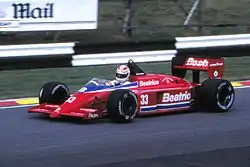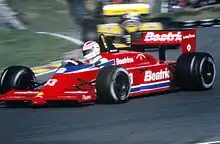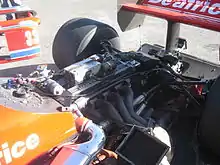Lola THL1
The Lola THL1 was a Formula One racing car designed by Neil Oatley for Team Haas (USA) Ltd. during four of the last five races of the 1985 Formula One season. The car used the 750 bhp (559 kW; 760 PS), turbocharged Hart 415T Straight 4 engine. The Haas Lola team only had one car for 1985 and it was driven by 1980 World Champion Alan Jones, who was making a full-time comeback to Formula One at the age of 39.
 | |||||||||
| Category | Formula One | ||||||||
|---|---|---|---|---|---|---|---|---|---|
| Constructor | Team Haas (USA) Ltd. | ||||||||
| Designer(s) | Neil Oatley | ||||||||
| Successor | THL2 | ||||||||
| Technical specifications[1][2] | |||||||||
| Chassis | Carbon fibre with aluminium honeycomb monocoque | ||||||||
| Suspension (front) | Double wishbones, push-rod and rocker actuated coil springs over dampers, anti-roll bar | ||||||||
| Suspension (rear) | Double wishbones, push-rod and rocker actuated coil springs over dampers, anti-roll bar | ||||||||
| Axle track | Front: 1,778 mm (70.0 in) Rear: 1,662 mm (65.4 in) | ||||||||
| Wheelbase | 2,720 mm (107 in) | ||||||||
| Engine | Hart 415T, 1,459 cc (89.0 cu in), Straight 4, turbo, mid-engine, longitudinally mounted | ||||||||
| Transmission | Hewland / FORCE 6-speed manual | ||||||||
| Weight | 557 kg (1,228 lb) | ||||||||
| Fuel | Shell / BP | ||||||||
| Tyres | Goodyear | ||||||||
| Competition history | |||||||||
| Notable entrants | Team Haas (USA) Ltd. | ||||||||
| Notable drivers | |||||||||
| Debut | 1985 Italian Grand Prix | ||||||||
| |||||||||
| Constructors' Championships | 0 | ||||||||
| Drivers' Championships | 0 | ||||||||
1985


The THL1 maded its debut at the Italian Grand Prix at Monza, with Jones qualifying 25th, 9.859 seconds behind pole sitter Ayrton Senna (Lotus-Renault), but retiring after just 6 laps due to an overheating engine. The next race, the Belgian Grand Prix, had been rescheduled from 2 June so the team were not allowed to compete because they were not on the original entry list. Jones then qualified 18th for the South African Grand Prix which saw the French Renault and Ligier teams boycott the race for political reasons, and the RAM and Zakspeed teams not enter, but withdrew before the race due to illness (rumour had it that the Haas team had bowed to political pressure and withdrew, though Jones refutes this contending that he was indeed sick with the flu).
Jones showed the potential of the car in the final race of the season, the first ever Australian Formula One Grand Prix (the 1985 AGP was in fact the 50th running of the race, but it was the first time it was part of the FIA World Championship). The Australian qualified 19th for his home race but stalled the car at the start leaving him dead last. After getting a push start and being almost a quarter of a lap behind, Jones fought his way through the field and was up to 6th and into the points by lap 20 before being forced to retire with electrical trouble.
1986
The car was to be replaced for the start of the 1986 season but the new Lola THL2 was delayed meaning that the THL1 was pressed into service for the first three races of the season, its last race being the San Marino Grand Prix. Joining the Australian ex-World Champion in a second car was ex-Ferrari and Renault driver, Frenchman Patrick Tambay. The car would still use the turbocharged Hart engine, but when the THL2 appeared in San Marino for Jones to drive, it was powered by the new, 900 bhp (671 kW; 912 PS) Ford TEC V6 turbo designed by Keith Duckworth and John Baldwin (Duckworth was the designer of the highly successful Cosworth DFV engine). Neither Jones or Tambay would score a point with the Lola Hart THL1. Despite Jones praising the new car and its engine, the team had finally got some speed out of the THL1 with Tambay qualifying 11th, some 2.226 faster and 12 places better than Jones in the THL2.
The car was called a Lola but its only connection to the famous Lola Cars was because of car owner Carl Haas's previous close association with Lola founder Eric Broadley, who was also named as chief engineer for the team in 1985. The THL1 was actually designed by Haas-owned design and construction company known as FORCE. A member of Neil Oatley's design team was an up-and-coming Ross Brawn, the team's lead aerodynamicist who did most of the wind tunnel testing of both the THL1 and THL2. Lola however earned the team's points towards the Constructors Championships as the team's designated constructor.
During a 2012 interview series with Formula One legends, Alan Jones described the underpowered Hart 415T engine as like "sending a boy to do a mans job", adding that it was an old Formula 2 engine that someone had thrown a turbo on and said "lets go and do Formula One".[3] Up against the financial and technical resources of Ferrari, Renault, Honda, BMW and TAG-Porsche, results were few and far between for those using Brian Hart's engines. The THL1 was the last car to use the turbocharged Hart engine in Formula One.
Complete Formula One results
(key)
| Year | Entrant | Engine | Tyres | Driver | 1 | 2 | 3 | 4 | 5 | 6 | 7 | 8 | 9 | 10 | 11 | 12 | 13 | 14 | 15 | 16 | Pts. | WCC |
|---|---|---|---|---|---|---|---|---|---|---|---|---|---|---|---|---|---|---|---|---|---|---|
| 1985 | Team Haas (USA) Ltd. | Hart 415T S4 tc |
G | BRA | POR | SMR | MON | CAN | DET | FRA | GBR | GER | NED | AUT | ITA | BEL | EUR | RSA | AUS | 0 | NC | |
| Alan Jones | Ret | Ret | DNS | Ret | ||||||||||||||||||
| 1986 | Team Haas (USA) Ltd. | Hart 415T S4 tc |
G | BRA | ESP | SMR | MON | BEL | CAN | DET | FRA | GBR | GER | HUN | AUT | ITA | EUR | MEX | AUS | 6* | 8th | |
| Alan Jones | Ret | Ret | ||||||||||||||||||||
| Patrick Tambay | Ret | 8 | Ret |
References
- "1985 Beatrice-Lola THL1 Hart - Images, Specifications and Information". Ultimatecarpage.com. 23 October 2009. Retrieved 23 August 2010.
- "STATS F1 • Lola THL1". Statsf1.com. Retrieved 23 August 2010.
- "Development Drag - 1985 Haas-Lola TLH1". carthrottle.com. Retrieved 12 September 2016.